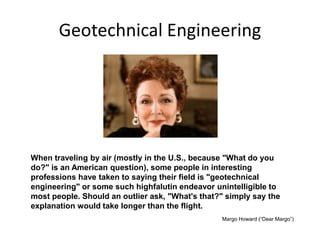The Ultimate Guide To Geotheta
The Ultimate Guide To Geotheta
Blog Article
Geotheta Can Be Fun For Everyone
Table of ContentsIndicators on Geotheta You Should KnowSome Known Details About Geotheta Geotheta Fundamentals ExplainedExcitement About GeothetaFacts About Geotheta Uncovered

They conduct site investigations, collect samples, do lab examinations, and assess data to review the viability of the ground for construction projects - Geotechnical Engineers. Based on their searchings for, geotechnical designers give recommendations for structure style, slope security, preserving frameworks, and mitigation of geotechnical risks. They collaborate with other specialists, such as architects, architectural designers, and building and construction teams, to ensure that geotechnical considerations are integrated into the total job style and application
By analyzing the habits and properties of soil and rock, they can recognize possible geotechnical threats such as landslides, dirt settlement, or incline instability. Their competence helps prevent failings or crashes that could threaten lives and property. Here are some in-depth responsibilities and duties of a geotechnical designer: Website Examination: Geotechnical designers conduct site investigations to gather information on subsurface conditions.
They interpret the information to recognize the residential properties and habits of the soil and rock, including their stamina, leaks in the structure, compaction features, and groundwater conditions. Geotechnical Evaluation and Design: Geotechnical engineers evaluate the data accumulated throughout website investigations to analyze the security and suitability of the site for building and construction projects. They do geotechnical computations and modeling to review factors such as bearing capacity, settlement, slope security, lateral planet stress, and groundwater circulation.
Indicators on Geotheta You Should Know
Foundation Layout: Geotechnical designers play a critical duty in creating structures that can safely support the desired structure. They evaluate the dirt conditions and lots needs to figure out the proper structure kind, such as shallow foundations (e.g., grounds), deep foundations (e.g (https://www.awwwards.com/geotheta/)., piles), or specialized techniques like soil enhancement. They consider elements such as settlement limitations, bearing capability, and soil-structure communication to establish optimum foundation designs
They assess construction strategies, screen website activities, and conduct area evaluations to verify that the design suggestions are adhered to. If unpredicted geotechnical problems occur, they analyze the scenario and supply suggestions for remediation or modifications to the design. Threat Analysis and Reduction: Geotechnical designers evaluate geotechnical risks and dangers connected with the job website, such as landslides, liquefaction, or dirt disintegration.

Partnership and Interaction: Geotechnical designers work carefully with other professionals associated with a project, such as designers, structural designers, and construction groups. Efficient interaction and partnership are necessary to integrate geotechnical considerations right into Get the facts the overall project layout and building procedure. Geotechnical designers offer technological expertise, solution questions, and ensure that geotechnical needs are fulfilled.
How Geotheta can Save You Time, Stress, and Money.
Below are some types of geotechnical designers: Foundation Designer: Foundation designers concentrate on creating and analyzing foundations for structures. They analyze the soil problems, load demands, and site features to determine the most appropriate foundation type and design, such as shallow foundations, deep structures, or specialized strategies like stack structures.
They assess the aspects affecting slope security, such as soil residential or commercial properties, groundwater problems, and slope geometry, and create methods to protect against slope failures and mitigate threats. Earthquake Designer: Earthquake designers focus on examining and making frameworks to endure seismic pressures. They analyze the seismic risk of a website, examine soil liquefaction potential, and establish seismic style requirements to ensure the security and strength of frameworks throughout earthquakes.
They perform field screening, accumulate samples, and examine the collected data to characterize the soil residential properties, geologic developments, and groundwater conditions at a site. Geotechnical Instrumentation Designer: Geotechnical instrumentation designers concentrate on tracking and gauging the habits of dirt, rock, and structures. They install and preserve instrumentation systems that keep an eye on elements such as dirt settlement, groundwater levels, incline activities, and architectural displacements to assess performance and supply early warnings of prospective concerns.
The Buzz on Geotheta
They perform tests such as triaxial tests, combination examinations, direct shear tests, and permeability examinations to gather data for geotechnical analysis and design. Geosynthetics Engineer: Geosynthetics designers specialize in the design and application of geosynthetic products, such as geotextiles, geogrids, and geomembranes. They use these products to boost dirt stability, strengthen inclines, supply water drainage solutions, and control disintegration.
They have a tendency to be investigatory people, which implies they're intellectual, introspective, and curious. They are curious, systematic, sensible, analytical, and rational. Some of them are likewise social, meaning they're kind, generous, cooperative, person, caring, useful, empathetic, skillful, and friendly - Geotechnical Engineers.
In the office setting, geotechnical engineers use specialized software program devices to carry out computations, produce styles, and examine data. They prepare records, review job specifications, interact with clients and group members, and coordinate task tasks. The office setup offers a favorable environment for research study, evaluation, and cooperation with other professionals associated with the project.
The Only Guide to Geotheta
They regularly check out project websites to conduct website examinations, assess geotechnical problems, and collect data for analysis. These gos to include traveling to different areas, occasionally in remote or tough terrains. Geotechnical engineers might do soil sampling, conduct tests, and screen building and construction tasks to ensure that the geotechnical facets of the job are being implemented correctly.
Geotechnical designers also work in specialized geotechnical research laboratories. Geotechnical lab engineers work thoroughly in these settings, taking care of testing devices, running tools, and videotaping information.
Report this page